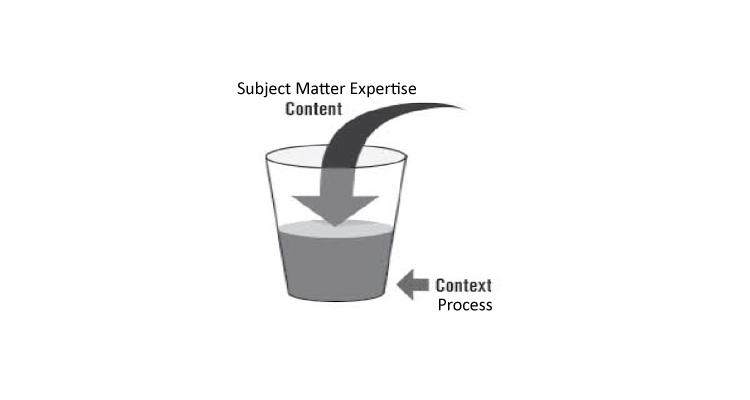October 2011 - The FoCuSeD™ Facilitator eNewsletter

Content Knowledge and the Facilitator | Gary Rush Facilitation
Occasionally, when clients ask me to facilitate workshops, they begin by asking, “Have you worked in our industry in the past?” They are looking for content knowledge, much as they would if they were hiring a consultant. This needs to change.
Facilitator versus Consultant
- A Facilitator is a content neutral person who guides a group of people enabling them to come together and accomplish their task.
- A Consultant is a professional who provides expert advice in a particular area of expertise (from Wikipedia).
A significant difference is that the Facilitator is content neutral (Facilitators are responsible for the context) and the Consultant provides expert advice (Consultants provide content knowledge). Therefore, hiring Facilitators requires a different set of guidelines.
Hiring a Facilitator
When hiring a Facilitator, asking about their industry knowledge can be self-defeating. If a Facilitator has knowledge about a particular industry, he or she may become biased and inadvertently violate neutrality – this can be problematic. This may be in part because he or she listens with a different perspective – assumptions about content knowledge taint what her or she hears. When hiring a Facilitator, ask the following:
- Is the Facilitator an IAF Certified™ Professional Facilitator (CPF)? This is the most critical question because if the Facilitator is a CPF, then the remaining questions are about degree of competence. A CPF is a credentialed Facilitator who has demonstrated evidence of meeting the core Facilitator competencies. Hiring a CPF ensures that the core Facilitator competencies are met.
- How well does the Facilitator listen? This is the most critical and important skill a Facilitator brings. It is critical to help the participants hear what is really being said – otherwise the dialog stops. This critical skill is what separates an average Facilitator from an effective one.
- Does the Facilitator have experience with the type of workshop I need? If the client is looking for a Facilitator to facilitate a Strategic Plan and the Facilitator has no experience designing a Strategic Planning Workshop, then he or she is learning on the job. Clients need a Facilitator who has process experience in the particular type of workshop.
- Does the Facilitator prepare? Some Facilitators have facilitated workshops without preparing – interviewing participants to know what he or she is walking into. Preparation is critical. It ensures that the workshop is designed to accomplish what the group needs to accomplish. It enables the Facilitator to determine the group dynamics so that he or she can plan how the group will evolve to achieve useful solutions. Never hire a Facilitator who does not prepare. Without preparation, the workshop will fail.
- What else does the Facilitator provide? This relates to whether the Facilitator provides a documenter. This is optional, depending on client needs.
You might note, that content knowledge is not mentioned in any of the questions above. That’s because Facilitators don’t need to know content – that’s the responsibility of the Subject Matter Experts (SMEs) – the participants. The Facilitator needs to be a process expert.
Content Knowledge
My job is to listen to what the participants say, reflect back to them what they have said, and move them through a process. I need to know the process – well. They need to know the content – well. Effective Preparation helps me gain sufficient knowledge of their terminology, basic concepts and their business. When I interview the participants, I ask them about terminology or basic concepts that are unfamiliar to me. I talk with the client to clearly understand what he or she is requesting, clarifying terminology and basic concepts in the process. This preparation ensures that I have a basic understanding of the business and can focus on the process.
Active Listening is required in the workshop so that I can follow the participants. It is a skill for effective communication, understanding, and comprehension. As an active listener, you feed back what the other person has said – their intended message. I use the words of the experts. I ask if I don’t understand. When the Facilitator listens and reflects, using the words and concepts of the subject matter experts, it works very well.
Stages of Active Listening
- Make contact – connect with the person or persons speaking. Over 50% of communication is non-verbal.
- Absorb – this is the difficult part. Hear what they are saying without judging or evaluating. Do not analyze, it gets in the way of hearing.
- Reflect – feed back what you’ve heard. Use the speaker’s words, although not necessarily word for word. This is when understanding comes in.
- Receive Confirmation – check with the participants that you heard and understood the message accurately. Remember, it’s their words, not yours.
Conclusion
If you are hiring Facilitators, hire based on his or her ability to listen, process experience, and whether or not he or she is a CPF. You have the content knowledge; you need the process knowledge. If you are a Facilitator, be diligent in preparation and use effective Active Listening. Effective Facilitators, as process experts can facilitate successfully in any industry. ![]()

